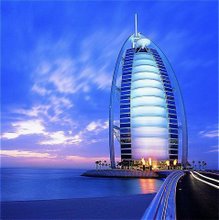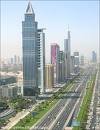Tuesday, April 10, 2007
Sculpting Dubai's workforce
By Dr Rod Monger, Special to Gulf News
Numbers may be keys to the nature of Dubai's workforce and its economy. According to a 2005 government report, 97.13 per cent of Dubai's total labour force is foreign. Luxembourg limps in next with 59.75 per cent, and thereafter the percentage drops below 25 per cent with only 10 countries having more than 10 per cent.
This is the first of three deeply important numbers.
The second number - mostly likely unknown - is the percentage of those foreign workers who have come to regard Dubai as home or would like to make it their permanent home. Many of these expats came to Dubai 15 to 20 years ago for a two-year stint, liked it and stayed.
The third number, also from the government, is that only five per cent of Emiratis are employed in the private sector.
Taken together, these numbers offer an unparalleled opportunity to Dubai. While the downside is that almost everyone from managers to construction crews must be imported, so to speak, the upside is that Dubai can essentially sculpt its workforce, and by doing so, shape its future economy. No other location on the globe has quite the same possibilities.
Five years ago, the situation was different because Dubai, in international recruitment terms, was regarded as something of a hardship post. Expats came because they were given attractive wage packages which allowed them to sock away savings.
They also came because they regarded Dubai as the best place to work in the Middle East, says Mike Hynes, Managing Partner with recruiting firm Kershaw Leonard. One reason was the ability to get a broad range of experience fast to speed promotion.
Now, Dubai no longer works as a quick financial fix. Foreigners who do their homework before they come discover that costs are high, says Hynes.
Employers also report that they are having more difficulty recruiting and retaining expats. Rising costs mean that salaries may support the local lifestyle but not ambitious savings plans. So, disappointed short-timers are drifting back home.
Worse, Hynes thinks, some short-timers now come for flimsier reasons. A tourist on holiday thinks 'what a great place' and tries his hand in the job market. He remembers one interview in which he could not identify the reason why the British woman wanted the job. So he asked "Why Dubai?" and her response was "tennis without the rain."
Committed workforce
But Dubai's workforce is gaining strength in terms of both quantity and quality. Even though the number of workers has risen dramatically in the last few years, demand has been rising at least as fast. "The quality is here," says Hynes, "but you have to look for it harder."
In the future, that quality has to continue rising, and maybe rise faster than the economy is growing. The reason is that economists point to the critical contribution capable knowledge workers make to economic growth.
Writing for the Harvard Business Review in 2004, Richard Florida - author of The Rise of the Creative Class - hammers home the importance of investing in these people.
Florida defines the "creative class" as scientists, engineers, architects, designers, educators, artists, musicians and entertainers who create new ideas, technology or content. Their value is that (and here more poignant words are not possible) "wherever creativity goes - and by extension, wherever talent goes - innovation and economic growth are sure to follow."
Not surprisingly, says Florida, studies show that countries with a higher proportion of creative workers are also those countries which are most competitive.
Over its history, the US has benefited immensely from the inflow of talented people. During Second World War, for example, numerous scientists and other intellectuals fled war-torn Europe.
From around the world, creative people came for opportunity. Their success, which was also the US's success, is evident everywhere, Florida notes. Chinese and Indian immigrants now run more than 30 per cent of all Silicon Valley start-ups. He points to Moscow-born Sergey Brin, co-founder of Google and now worth billions, and Bangalore-bred Sabeer Bhatia who co-founded Hotmail as examples.
Global competition for the creative crowd is getting tough. In developed countries, baby-boomers represent as much as 60 per cent of the labour force which means that many knowledge workers will soon retire. That will create a critical shortfall of skills, a gap which can only be filled with foreign labour, says Florida.
But, alas, countries like India and China are now luring their people back to opportunities in their own countries.
Talent attraction
Other nations with their own economic growth at stake are also aggressively recruiting the cream of the crop. New Zealand's Minister for Research, Science and Technology, Pete Hodgson, says his country looks at immigration as a "talent-attraction function necessary for economic growth" rather than as gate-keeper.
The Monitor Group, a consulting firm comprised of many high profile thought leaders, recommended that Korea focus on creating an inflow of foreign knowledge which was just as important, if not more so, than attracting foreign direct investment.
Hynes thinks Dubai is a contender. What attracts educated people to Dubai, he thinks, are safety, great climate, beaches, and outdoor activities.
But opportunity is the major lure. They are "gold dust," he says, referring to the alpha crowd. For example, after two or three major assignments, a project manager can pretty much name his price and pick the opportunity. People like that want challenges, to scale the next peak, and they want to be associated only with the best to burnish their CVs.
California-based Joel Kotkin, author The New Geography, is an expert on knowledge workers and where they choose to live and work.
In an interview for this article, Kotkin says the issue of what attracts knowledge workers has sparked much debate with little resolution.
Some say that the arts, culture and 'bohemianism' are big factors but Kotkin pooh-poohs this idea. It is true, he says, that educated people will often opt for "sprawling, warm, family-oriented places."
Age is also a factor. High-life cities that attract twenty-somethings begin to lose out as knowledge workers begin families. Concerns about housing affordability, good schools and safe streets take precedence over hip and cool.
OpportunityKotkin also says "there must be a growing economy to keep people in the area." Expensive locales can be attractive if they provide an opportunity, lifestyle balance and maybe a concentration of venture capital and similar support for entrepreneurs.
What else attracts knowledge workers? Education. "Students are a leading indicator of global talent flows," says Florida. Usually regions that attract them for educational purposes have an advantage in retaining them, at least for a time.
Boston, with 65 colleges and universities, is an excellent example. Its young, highly educated workforce, some of whom become Route 128 entrepreneurs is comprised of many people who went to college in Boston and decided to stay.
Kotkin says, "Of course, a great university is important but it is critical that these schools have strong business, law, engineering, and science programmes."
The everyday struggle to recruit talented knowledge workers also depends a great deal on the human resource management skills of area employers. The word on the street is that those skills need some upgrading.
In developed countries, recruitment of talented college students is a partnership. Universities attempt to be responsive to recruitment needs.
But at the same time, prospective employers make long-term commitments to universities with the view that building a larger pool of well-educated young people is a rising tide that will float many boats.
Ratcheting workforce quality could also depend on pruning deadwood. A report produced by McKinsey & Company argues that labour policies created in the 1970s to attract foreign labour are now serving GCC nations poorly. Essentially, cheap imported labour undercuts the need to invest in more capital-intensive processes which would hoist productivity. That has dropped by as much as 20 to 35 per cent over the past decade, including in construction where productivity is only one-quarter of that in the United States, they say. More importantly, the McKinsey report suggests that current foreign labour practices also create an imbalance between the competitiveness of nationals and foreign workers.
Making changes in immigration practices would, they suggest, "raise the cost of foreign workers compared with the cost of nationals and forestall further increases in expatriate populations." But that, the report notes, must be accompanied by efforts to synchronise the skills of Nationals with private sector needs.
High End
One question, of course, is how high on the human resources food chain Dubai wants to go. Considering the bias towards leadership on all fronts, the answer is easy enough to figure out.
But attracting future Nobel prize winners is a whole new ballgame. Their needs, and their toys, are enough to leave even jaded billionaires with their luxurious villas, yachts and private jets breathless - multi-billion dirham linear particle accelerators and massively parallel supercomputers with teraflop capacity.
Supercomputers are not the exotica they once were. These days they work on a myriad of problems including weather simulation, modelling human brain neuron activity, medical research, aircraft design and even helping students visualise the impact of different options available to corporate financial decision-makers.
For example, Ali Termos, a business professor at University of Sharjah, recently researched the impact of Federal Reserve Bank policy on US commercial loans. His project examined four million items of data which took a supercomputer, provided through the University of North Carolina where he was studying at the time, eight hours to sort through to make the necessary calculations. The results are significant enough to make US monetary policy-setters sit up and take notice.
Building and maintaining a fast-forward technology infrastructure requires faith in the potential results, and courage. Lots of courage. The basic research questions that might be answered by a particle accelerator or supercomputer are a long distance upstream from commercially-viable results.
Nonetheless, if these results are the fertile Nile delta then, for lack of a better analogy, such research activity is Victoria Falls. But would such facilities, properly conceived and managed, really attract the world's intellectual elite? As we say back home, "like bees to honey" Now, all that Dubai needs is the hive.
The writer is a business professor at the American University in Dubai.
Numbers may be keys to the nature of Dubai's workforce and its economy. According to a 2005 government report, 97.13 per cent of Dubai's total labour force is foreign. Luxembourg limps in next with 59.75 per cent, and thereafter the percentage drops below 25 per cent with only 10 countries having more than 10 per cent.
This is the first of three deeply important numbers.
The second number - mostly likely unknown - is the percentage of those foreign workers who have come to regard Dubai as home or would like to make it their permanent home. Many of these expats came to Dubai 15 to 20 years ago for a two-year stint, liked it and stayed.
The third number, also from the government, is that only five per cent of Emiratis are employed in the private sector.
Taken together, these numbers offer an unparalleled opportunity to Dubai. While the downside is that almost everyone from managers to construction crews must be imported, so to speak, the upside is that Dubai can essentially sculpt its workforce, and by doing so, shape its future economy. No other location on the globe has quite the same possibilities.
Five years ago, the situation was different because Dubai, in international recruitment terms, was regarded as something of a hardship post. Expats came because they were given attractive wage packages which allowed them to sock away savings.
They also came because they regarded Dubai as the best place to work in the Middle East, says Mike Hynes, Managing Partner with recruiting firm Kershaw Leonard. One reason was the ability to get a broad range of experience fast to speed promotion.
Now, Dubai no longer works as a quick financial fix. Foreigners who do their homework before they come discover that costs are high, says Hynes.
Employers also report that they are having more difficulty recruiting and retaining expats. Rising costs mean that salaries may support the local lifestyle but not ambitious savings plans. So, disappointed short-timers are drifting back home.
Worse, Hynes thinks, some short-timers now come for flimsier reasons. A tourist on holiday thinks 'what a great place' and tries his hand in the job market. He remembers one interview in which he could not identify the reason why the British woman wanted the job. So he asked "Why Dubai?" and her response was "tennis without the rain."
Committed workforce
But Dubai's workforce is gaining strength in terms of both quantity and quality. Even though the number of workers has risen dramatically in the last few years, demand has been rising at least as fast. "The quality is here," says Hynes, "but you have to look for it harder."
In the future, that quality has to continue rising, and maybe rise faster than the economy is growing. The reason is that economists point to the critical contribution capable knowledge workers make to economic growth.
Writing for the Harvard Business Review in 2004, Richard Florida - author of The Rise of the Creative Class - hammers home the importance of investing in these people.
Florida defines the "creative class" as scientists, engineers, architects, designers, educators, artists, musicians and entertainers who create new ideas, technology or content. Their value is that (and here more poignant words are not possible) "wherever creativity goes - and by extension, wherever talent goes - innovation and economic growth are sure to follow."
Not surprisingly, says Florida, studies show that countries with a higher proportion of creative workers are also those countries which are most competitive.
Over its history, the US has benefited immensely from the inflow of talented people. During Second World War, for example, numerous scientists and other intellectuals fled war-torn Europe.
From around the world, creative people came for opportunity. Their success, which was also the US's success, is evident everywhere, Florida notes. Chinese and Indian immigrants now run more than 30 per cent of all Silicon Valley start-ups. He points to Moscow-born Sergey Brin, co-founder of Google and now worth billions, and Bangalore-bred Sabeer Bhatia who co-founded Hotmail as examples.
Global competition for the creative crowd is getting tough. In developed countries, baby-boomers represent as much as 60 per cent of the labour force which means that many knowledge workers will soon retire. That will create a critical shortfall of skills, a gap which can only be filled with foreign labour, says Florida.
But, alas, countries like India and China are now luring their people back to opportunities in their own countries.
Talent attraction
Other nations with their own economic growth at stake are also aggressively recruiting the cream of the crop. New Zealand's Minister for Research, Science and Technology, Pete Hodgson, says his country looks at immigration as a "talent-attraction function necessary for economic growth" rather than as gate-keeper.
The Monitor Group, a consulting firm comprised of many high profile thought leaders, recommended that Korea focus on creating an inflow of foreign knowledge which was just as important, if not more so, than attracting foreign direct investment.
Hynes thinks Dubai is a contender. What attracts educated people to Dubai, he thinks, are safety, great climate, beaches, and outdoor activities.
But opportunity is the major lure. They are "gold dust," he says, referring to the alpha crowd. For example, after two or three major assignments, a project manager can pretty much name his price and pick the opportunity. People like that want challenges, to scale the next peak, and they want to be associated only with the best to burnish their CVs.
California-based Joel Kotkin, author The New Geography, is an expert on knowledge workers and where they choose to live and work.
In an interview for this article, Kotkin says the issue of what attracts knowledge workers has sparked much debate with little resolution.
Some say that the arts, culture and 'bohemianism' are big factors but Kotkin pooh-poohs this idea. It is true, he says, that educated people will often opt for "sprawling, warm, family-oriented places."
Age is also a factor. High-life cities that attract twenty-somethings begin to lose out as knowledge workers begin families. Concerns about housing affordability, good schools and safe streets take precedence over hip and cool.
OpportunityKotkin also says "there must be a growing economy to keep people in the area." Expensive locales can be attractive if they provide an opportunity, lifestyle balance and maybe a concentration of venture capital and similar support for entrepreneurs.
What else attracts knowledge workers? Education. "Students are a leading indicator of global talent flows," says Florida. Usually regions that attract them for educational purposes have an advantage in retaining them, at least for a time.
Boston, with 65 colleges and universities, is an excellent example. Its young, highly educated workforce, some of whom become Route 128 entrepreneurs is comprised of many people who went to college in Boston and decided to stay.
Kotkin says, "Of course, a great university is important but it is critical that these schools have strong business, law, engineering, and science programmes."
The everyday struggle to recruit talented knowledge workers also depends a great deal on the human resource management skills of area employers. The word on the street is that those skills need some upgrading.
In developed countries, recruitment of talented college students is a partnership. Universities attempt to be responsive to recruitment needs.
But at the same time, prospective employers make long-term commitments to universities with the view that building a larger pool of well-educated young people is a rising tide that will float many boats.
Ratcheting workforce quality could also depend on pruning deadwood. A report produced by McKinsey & Company argues that labour policies created in the 1970s to attract foreign labour are now serving GCC nations poorly. Essentially, cheap imported labour undercuts the need to invest in more capital-intensive processes which would hoist productivity. That has dropped by as much as 20 to 35 per cent over the past decade, including in construction where productivity is only one-quarter of that in the United States, they say. More importantly, the McKinsey report suggests that current foreign labour practices also create an imbalance between the competitiveness of nationals and foreign workers.
Making changes in immigration practices would, they suggest, "raise the cost of foreign workers compared with the cost of nationals and forestall further increases in expatriate populations." But that, the report notes, must be accompanied by efforts to synchronise the skills of Nationals with private sector needs.
High End
One question, of course, is how high on the human resources food chain Dubai wants to go. Considering the bias towards leadership on all fronts, the answer is easy enough to figure out.
But attracting future Nobel prize winners is a whole new ballgame. Their needs, and their toys, are enough to leave even jaded billionaires with their luxurious villas, yachts and private jets breathless - multi-billion dirham linear particle accelerators and massively parallel supercomputers with teraflop capacity.
Supercomputers are not the exotica they once were. These days they work on a myriad of problems including weather simulation, modelling human brain neuron activity, medical research, aircraft design and even helping students visualise the impact of different options available to corporate financial decision-makers.
For example, Ali Termos, a business professor at University of Sharjah, recently researched the impact of Federal Reserve Bank policy on US commercial loans. His project examined four million items of data which took a supercomputer, provided through the University of North Carolina where he was studying at the time, eight hours to sort through to make the necessary calculations. The results are significant enough to make US monetary policy-setters sit up and take notice.
Building and maintaining a fast-forward technology infrastructure requires faith in the potential results, and courage. Lots of courage. The basic research questions that might be answered by a particle accelerator or supercomputer are a long distance upstream from commercially-viable results.
Nonetheless, if these results are the fertile Nile delta then, for lack of a better analogy, such research activity is Victoria Falls. But would such facilities, properly conceived and managed, really attract the world's intellectual elite? As we say back home, "like bees to honey" Now, all that Dubai needs is the hive.
The writer is a business professor at the American University in Dubai.
Subscribe to:
Post Comments (Atom)






No comments:
Post a Comment